External links
- The Wedding at IMDb
- The Wedding at Film Polski (link in Polish)
- The Wedding Archived 2016-03-26 at the Wayback Machine at Stopklatka (link in Polish)
- Knee-Slappers: Poland’s Most Beloved Comedies
| The Wedding | |
|---|---|
| Original title | Wesele |
| Directed by | Wojciech Smarzowski |
| Written by | Wojciech Smarzowski |
| Produced by | Anna Iwaszkiewicz Dariusz Pietrykowski Bartłomiej Topa |
| Starring | Marian Dziędziel Iwona Bielska Tamara Arciuch Maciej Stuhr Bartłomiej Topa Paweł Wilczak Arkadiusz Jakubik Jerzy Rogalski Elżbieta Jarosik Lech Dyblik Tomasz Sapryk |
| Cinematography | Andrzej Szulkowski |
| Edited by | Paweł Laskowski |
| Music by | Tymon Tymański |
Release date |
|
Running time | 101 minutes |
| Country | Poland |
| Language | Polish |
| Box office | $701,000 |
The Wedding (Polish : Wesele) is a 2004 Polish dark comedy film directed by Wojciech Smarzowski.
The movie opens with the wedding of Janusz and Kasia. The father of the bride, Wieslaw Wojnar, gives Janusz a brand-new-looking Audi.
However, during the traditional, extravagant wedding feast, it is revealed that Wojnar bought Janusz the car as a bribe to marry Kasia, as she is pregnant. Wojnar has to pay several people off so that the wedding celebration can proceed smoothly. This includes securing a plot of land from his father-in-law, who is spending a lot of time in the men's room.
One of Kasia's old lovers is hired to videotape the wedding ceremony, but he's not interested in getting money out of Wojnar, as the others are. Eventually, Wojnar's situation gets worse and worse, as he has to bribe police officers and a notary public over the course of the long, drunken evening.
The director won the Eagle at the Polish Film Awards, the East of West Award - Special Mention at the Karlovy Vary International Film Festival and the Youth Jury Award - Special Mention at Locarno International Film Festival, while as writer he won the Best Script award at the Warsaw International Film Festival. Marian Dziedziel (Wojnar) won the Audience Award and the Eagle at the Polish Film Awards.
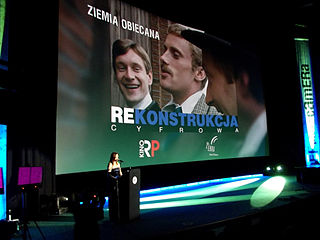
The history of cinema in Poland is almost as long as the history of cinematography, and it has universally recognized achievements, even though Polish films tend to be less commercially available than films from several other European nations.

Andrzej Witold Wajda was a Polish film and theatre director. Recipient of an Honorary Oscar, the Palme d'Or, as well as Honorary Golden Lion and Honorary Golden Bear Awards, he was a prominent member of the "Polish Film School". He was known especially for his trilogy of war films consisting of A Generation (1955), Kanał (1957) and Ashes and Diamonds (1958).

The Leon Schiller Polish National Film, Television and Theatre School in Łódź, commonly known as Łódź Film School is a Polish academy for future actors, directors, photographers, camera operators and television staff. It was founded on 8 March 1948 in Łódź (Lodz).
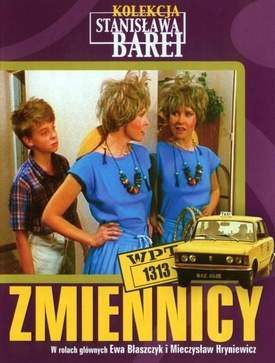
Zmiennicy is a Polish comedy TV series completed in 1986 and aired in 1987. Many famous Polish actors appear in Zmiennicy.

Silesia national football team, also known as Upper Silesia, Upper Silesia, Poland, Polish Silesia or Polish Upper Silesia is an informal regional football team made up of players from football clubs located in Silesia, under the auspices of the Silesian Football Association. It is not affiliated to FIFA, and does not play in official international matches.
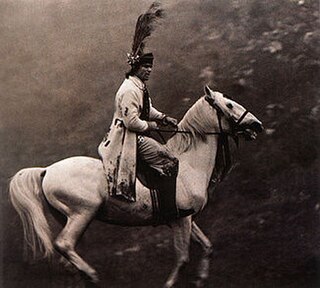
Wesele (The Wedding) is a motion picture made in 1972 in Poland by Andrzej Wajda as an adaptation of a play by the same title written by Stanisław Wyspiański in 1901. Wajda also directed "Wesele" for the theatre.
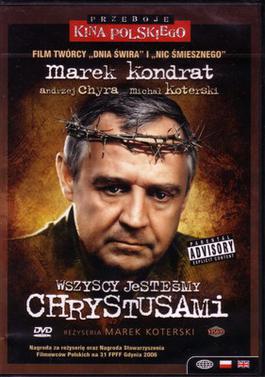
We're All Christs is a 2006 Polish comedy-drama film directed by Marek Koterski. It is the seventh in a nine-part series of films about the character Adaś Miauczyński, created by Koterski. Each story showcases a different aspect or era of his life, often with little continuity between them.

Polish Film Award, or Eagle is the national film award of Poland. It has been delivered annually since 1999, with the first event held on 21 June, by the National Chamber of Audiovisual Producers (KIPA). Since 2003 they have been awarded by the Polish Film Academy.
The 2003 Polish Film Awards ran on March 15, 2003. It was the 5th edition of Polish Film Awards: Eagles.
The 2007 Polish Film Awards ran on March 5, 2007 at Teatr Narodowy. It was the 9th edition of Polish Film Awards: Eagles. The ceremony was hosted by Zbigniew Zamachowski and Wojciech Malajkat.
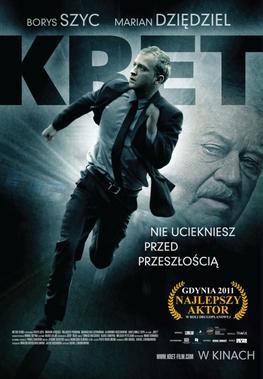
The Mole is a 2011 Polish drama film directed by Rafael Lewandowski. The film premiered at the 2011 Gdynia Film Festival.

Kisiel Prize or Kisiel Award is an annual Polish award presented in three categories: publicist, politician/public figure and entrepreneur whose actions most closely portray the spirit and beliefs of the Polish publicist and politician, Stefan Kisielewski (1919-1991).
Who Never Lived is a 2006 Polish drama film directed by Andrzej Seweryn. It was entered into the 28th Moscow International Film Festival.
The Collector is a 2005 Polish drama film directed by Feliks Falk. It was the Polish submission for the 2005 Academy Award for Best Foreign Language Film. Shooting for the film began in November 2004 and was completed on January 5, 2005. Shooting was taken in Warsaw and Wałbrzych.
The Polish Film Academy is a professional honorary organization dedicated to the advancement of the arts and sciences of motion pictures.

The Mighty Angel is a 2014 Polish drama film directed by Wojciech Smarzowski based on a book of the same name by Jerzy Pilch. It won Best Actor Award during 27th Tokyo International Film Festival.

These Daughters of Mine is a 2015 Polish comedy film directed by Kinga Dębska. The film was screened at Gdynia Film Festival in 2015 where it won both Audience and Journalist Awards. The same year, the film also became a recipient of Audience Award at the Ann Arbor Film Festival, and in 2016, was awarded with an Eagle Award from Polish Film Awards.
The Wedding, also known as The Wedding Day and The Wedding Day 2, is a 2021 Polish dark comedy film directed by Wojciech Smarzowski.
Trick is a 2010 Polish-language comedy thriller film directed by Jan Hryniak and written by Michał J. Zabłocki. It premiered on 9 March 2010.